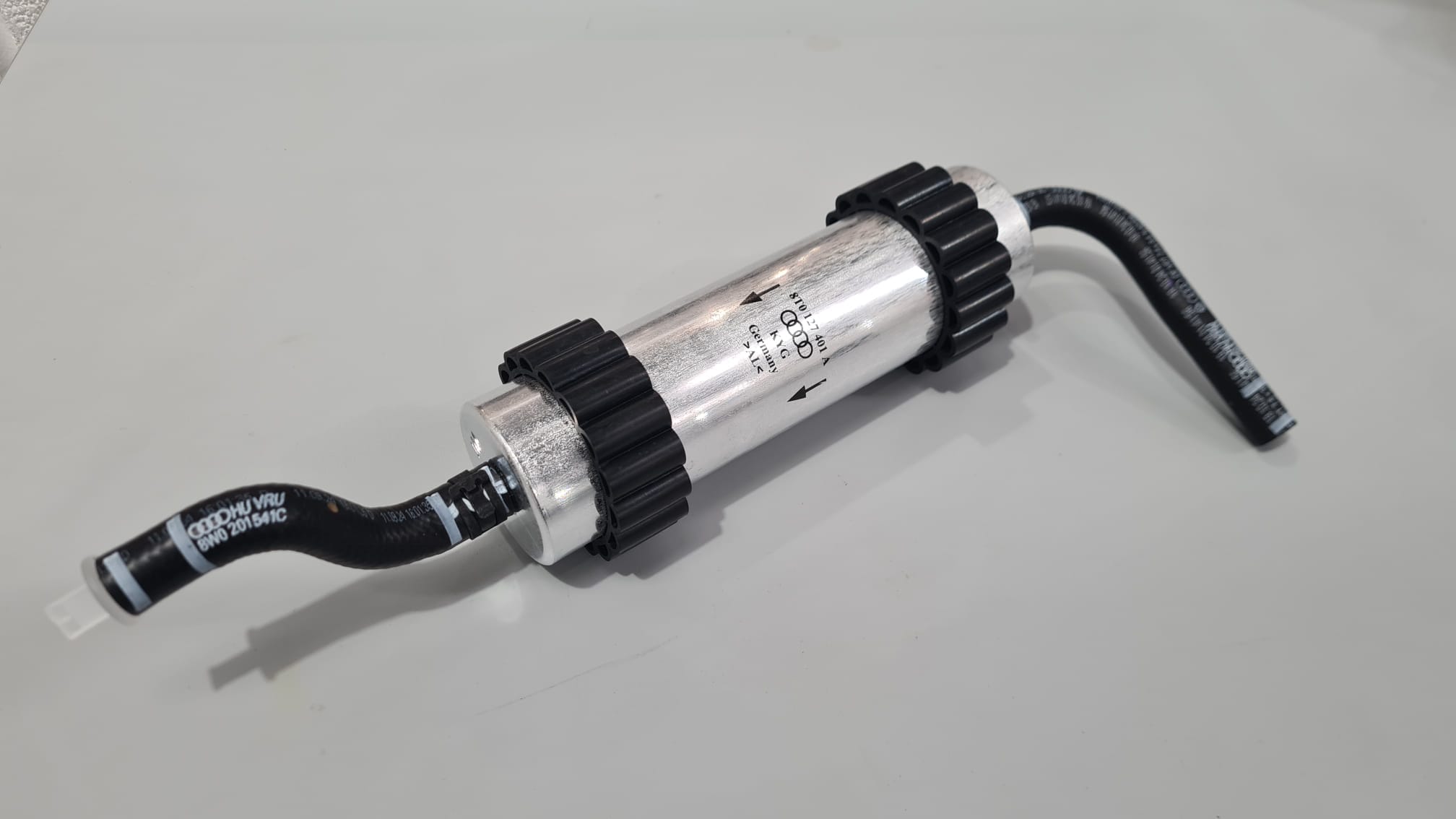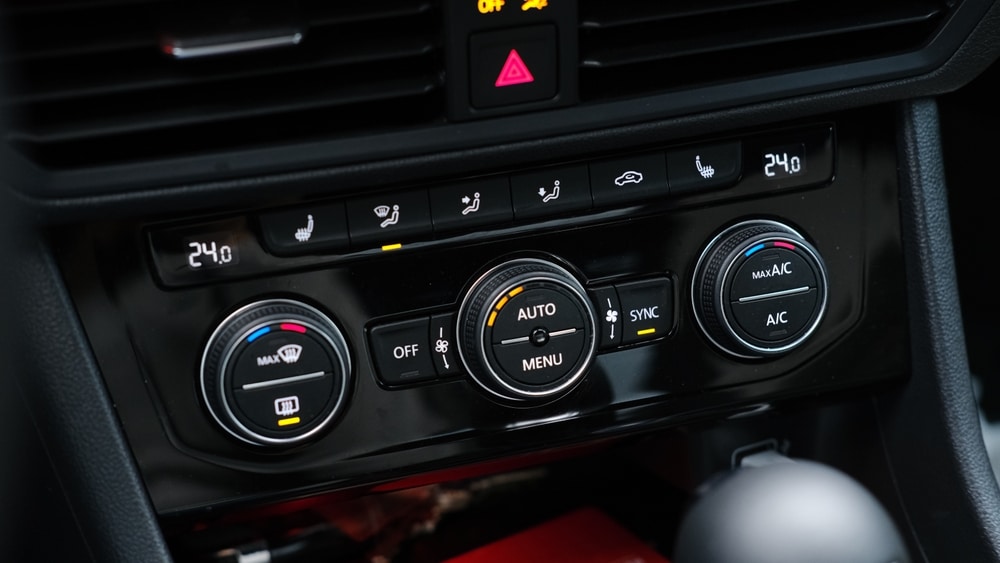Diesel Fuel Filter
Can something as small as a filter really stand between smooth driving and a costly breakdown?
Your diesel fuel filter protects vital fuel system components like your car’s injectors and the high-pressure pump from harmful particles and moisture. If it’s neglected (through lack of servicing), performance drops, faults develop, and repair bills soon mount up.
In this guide, you’ll uncover where the filter is located, how it works, what can go wrong when servicing is skipped, and why timely replacement is so important.
Are you unsure when your diesel fuel filter was last replaced? Call Shires Garage, Langport, today on 01458 250570 to book your service.
Where your diesel fuel filter is located
Your diesel fuel filter (part 4 in the diagram) is installed on the low-pressure side of the fuel system, sitting between the tank and the high-pressure pump.
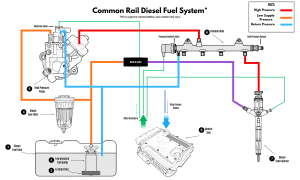
On most modern vehicles, it’s positioned in the engine bay, which allows easier access during servicing.
Many setups also feature a coarse strainer inside the tank (part 2), designed to capture larger debris before it reaches the filter.
To see how this component works as part of the wider system, check our Diesel Fuel System Guide.
The role of the diesel fuel filter
Your car’s diesel fuel filter protects your engine in the following ways:
- Capturing particles: The diesel fuel filter traps fine dirt and debris that would otherwise circulate through the system. If it’s not replaced in a timely manner, these contaminants can make their way through your diesel fuel system, blocking injectors and wearing out the high-pressure pump, resulting in expensive failures.
- Separating water: Diesel naturally contains small traces of water. Your vehicle’s diesel fuel filter removes this moisture before it moves further into the system, preventing corrosion and damage.
This small part acts as your main defence against fuel contamination. Book your diesel service today with Shires Garage, Langport on 01458 250570.
Types and construction of diesel fuel filters
Most modern diesel vehicles use a fine fuel filter (part 4 in the diagram), though the design varies depending on the system. The two main types are:
- Cartridge modules: This type of diesel fuel filter is the most common design in today’s diesels. A fixed housing, made of plastic or aluminium, contains a pleated, multi-layer filter element that traps debris and separates water. These housings may also include sensors, valves, or a hand primer. During servicing, the housing remains in place while the inner filter element is replaced.
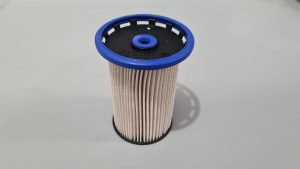
- Sealed filter units: These combine the housing and filter media in one sealed canister that is replaced entirely. They’re often found in older or heavy-duty vehicles. Some designs also feature built-in drain bowls or water separation.
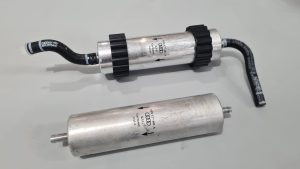
It’s worth mentioning that some diesel vehicles also include a coarse in-tank strainer (part 2 in the diagram), which captures larger debris before it can reach the main diesel fuel filter.
Regular servicing ensures your diesel fuel filter continues to protect your engine. It’s not worth skipping your service to save money; it’ll likely cost you in the long run.
Common problems with diesel fuel filters
If your diesel fuel filter develops an issue, the following problems can occur:
- Air leaks: Poor seals or incorrect fitting can let air into the low-pressure side of the system, leading to hesitation, stalling, or extended starting times.
- Blocked strainer: A clogged in-tank strainer makes your system’s lift pump work harder, often resulting in noisy operation and irregular diesel delivery.
- Incorrect fitment: Using the wrong diesel fuel filter or failing to seal it properly risks air ingress, fuel leaks, or unfiltered diesel bypassing the system.
- Restricted main filter: As debris builds up in the diesel fuel filter, diesel flow to the high-pressure pump is reduced, causing poor performance, long cranking, or even a no-start.
- Water ingress: If water is not separated, it can cause corrosion in injectors and the high-pressure pump, resulting in costly failures.
When was your diesel filter last checked? Call Shires Garage, Langport, today on 01458 250570 to book your diesel car service.
Diesel fuel filter service life and replacement
When it comes to your vehicle, there isn’t one fixed mileage or time for diesel filter replacement.
The correct timing always comes from the manufacturer’s service schedule, which should be followed carefully.
Yet, it’s important to remember these points:
- Correct filter choice: Always fit the diesel fuel filter designed for your car. Poor-quality parts can leak, restrict fuel flow, or fail to separate water properly. It’s just not worth using poor-quality parts.
- Water checks: Filters with drains or water sensors should be inspected at each service and drained when necessary.
- Priming step: After your diesel fuel filter is fitted, the system must be correctly primed using pumps or a hand primer. Skipping this step may leave air pockets, causing hard starting or pump damage.
- Efficiency decline: ISO testing shows water separation starts at over 95% when new, but this can drop to around 70% by the end of service life.
Keeping up with replacement is a vital part of preventative maintenance. So always ensure you follow the guidance in your vehicle’s handbook and don’t miss a scheduled service; missing one could result in a costly repair bill.
When did you last replace your diesel filter? Call Shires Garage, Langport, today for an expert service.
Protecting your diesel system
Replacing your diesel fuel filter at the right interval is a key part of preventative maintenance.
By following the manufacturer’s schedule, you reduce the chance of fuel system issues and keep your diesel running smoothly. Looking after it now helps you avoid more serious and costly repairs later.
When it comes to keeping your vehicle in safe hands, choosing the right garage is just as important. That’s why drivers in Langport, Taunton, and the surrounding areas turn to Shires Garage.
Why drivers choose Shires Garage
Local motorists rely on our experts because we provide:
- Skilled diesel technicians with years of experience.
- A complete 12-month parts and labour guarantee.
- Courtesy cars are available while your vehicle is with us.
We’re also backed by a {{average-rating}}⭐ Google rating from {{review-count}} customers across Langport and Taunton.
When was your diesel fuel filter last replaced? Book your diesel car service today; call Shires Garage, Langport on 01458 250570.
Diesel fuel filter FAQs for Langport drivers
What’s the role of my diesel fuel filter?
The diesel fuel filter removes harmful particles and water from the fuel before they can reach critical components like the injectors and high-pressure pump. Without it, contaminants could cause blockages, wear, and corrosion, leading to expensive failures.
What are the symptoms of a clogged diesel filter?
Signs of a diesel fuel filter blockage include sluggish acceleration, hesitation, difficulty starting, stalling, or even a complete no-start. Since these can overlap with other issues, it’s best to have the vehicle checked by a professional.
Can a blocked diesel fuel filter damage the high-pressure pump?
Yes. When your car’s diesel fuel filter is restricted, it reduces fuel flow and forces the high-pressure pump to work harder. Over time, this extra strain can cause premature wear or pump failure – these repairs often cost far more than replacing the filter.
How often should the diesel fuel filter be replaced?
There’s no fixed mileage. The correct interval depends on the manufacturer’s servicing schedule, which should always be followed.
Where is the diesel fuel filter?
It’s normally positioned in the low-pressure line between the tank and the high-pressure pump. On most modern diesel cars, you’ll find it in the engine bay. Many diesel fuel systems also include a coarse strainer in the tank, which catches larger debris before it reaches the main diesel fuel filter.
